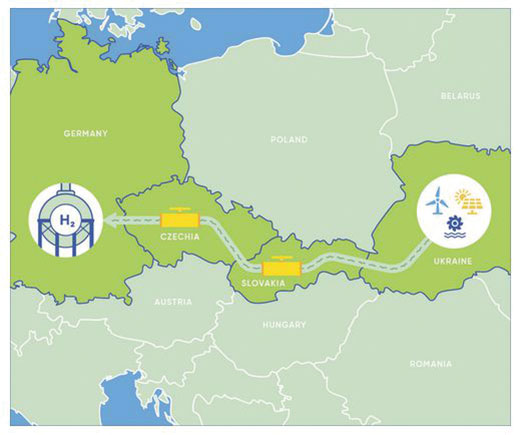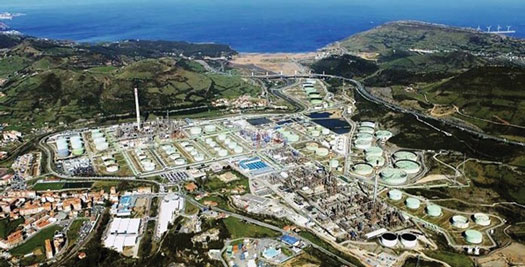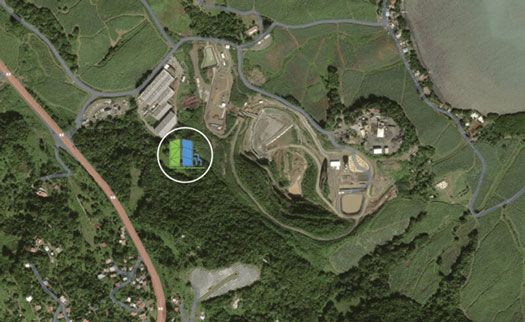Articles
Projects Update
EUROPE
Central European Hydrogen Corridor to develop H2 transport system

EUSTREAM, Gas TSO of Ukraine (GTSOU), NET4GAS and OGE have joined forces to develop an H2 highway through Central Europe. The focus of the joint initiative, called the Central European Hydrogen Corridor, is developing an H2 “highway” in Central Europe for the transport of H2. The H2 will be transported from promising future major H2 supply areas in Ukraine that offer excellent conditions for large-scale, green H2 production, via Slovakia and the Czech Republic, to large H2 demand areas in Germany and the EU.
The H2 corridor will also enable the transport of H2 between H2 production facilities and H2 consumers in the Czech Republic and Slovakia. The two countries are operating a large natural gas pipeline corridor connecting Ukraine with European demand areas. The Slovak, Czech and German gas pipeline systems can be repurposed to transport H2.
Germany is expected to become a major demand area of H2 in Europe. Importing a significant amount of H2 is essential to meet the projected demand in this region. The partners have already started to explore the technical feasibility of creating a Central European Hydrogen Corridor for the transportation of up to 120 GWh/d of pure H2 from Ukraine to Germany by 2030.
Ovako to decarbonize steel production with H2
Ovako to build on the success of its pilot project to heat steel with fossil-free H2 by preparing the first full-scale production installation at its Hofors mill in Sweden. Full implementation of H2-fueled heating will further reduce process emissions by a total of 80% from the 2015 baseline—an additional 50% from today’s already low levels.
Ovako aims to be at the forefront of the transition toward a sustainable society with no carbon emissions. In line with this goal, it is initiating 100% carbon-neutral steel production from 2022. Ovako’s climate initiatives have, so far, contributed to a reduction of its carbon footprint by 55% since 2015.
Beginning in January 2022 and until the goal is met, the company will counterbalance the remaining carbon emissions in production through carbon offsets. The use of offsets will gradually decrease as the company continues to invest in new technology and improve its processes.
Nel to deliver 5-MW electrolyzer to SGN in Scotland
Nel Hydrogen Electrolyser AS received a purchase order for a 5-MW alkaline water electrolyzer from SGN for the world’s first 100% H2-to-homes heating network on the east coast of Scotland.
The 5-MW alkaline electrolyzer is a fully redundant system, and the contract includes installation and commissioning, as well as a service and maintenance contract. The electrolyzer will deliver up to 2,093 kg/d of green H2 at 30 barg to SGN’s H100 Fife project in Scotland.
The project is the first-ever 100% H2 network of scale supplying green H2 from electrolysis to end users for the purposes of heating and cooking. The system will be powered by a nearby offshore wind turbine and grid electricity. The newly built H2 gas distribution network will supply up to 300 households initially with zero-carbon heat; however, both the electrolyzer and network have been sized to have the capacity to supply up to 900 homes as part of the planned future expansion of the H100 Fife project.
The H100 Fife project is a groundbreaking demonstration in evidencing the role that H2 can play in decarbonizing heat as alternative to natural gas. SGN is one of the UK’s largest gas distribution network companies, operating across Scotland, southern England and in Northern Ireland and supplying gas to 5.9 MM homes and business.
Repsol to start up first electrolyzer at its Petronor refinery

Repsol will start up the first electrolyzer in the northern Spanish region of Basque country in the second half of 2022, to produce renewable H2 at its Petronor refinery. The electrolyzer will have a capacity of 2.5 MW and will involve an investment of €8.9 MM, covering the construction of the necessary infrastructures for the use and distribution of the renewable hydrogen produced.
The project is included in the Basque Hydrogen Corridor (BH2C) Initiative, which will accelerate the economic recovery of the Basque Country and Spain, while advancing the decarbonization of the economy and promoting strategic sectors such as energy, mobility, industry and services.
Blue H2 development planned for Slovakia
EP Infrastructure (EPIF), Eustream, NAFTA and RWE Supply & Trading signed an MOU to jointly explore the potential development of blue H2 production facilities in eastern Slovakia. The partners aim to help accelerate the ramp-up of the H2 economy and significantly contribute to Europe’s decarbonization ambitions.
RWE Supply & Trading could offtake and import the produced H2 to Germany and other RWE core markets in Western Europe. The H2 could then be transmitted through a repurposed Eustream gas pipeline to Germany.
The CO2 captured during H2 generation could be stored within depleted natural gas fields in Slovakia or neighboring Central Eastern European countries, including Ukraine.
ASIA-PACIFIC
Yara, Kyushu Electric Power explore clean ammonia collaboration in Japan
Yara International ASA and Kyushu Electric Power Co. will collaborate to establish clean ammonia supply chains in Japan to reduce CO2 emissions at Kyushu’s thermal power generation plant in Kyushu Area, Japan.
The companies aim to jointly develop a clean ammonia (blue and green ammonia) end-to-end supply chain to Kyushu’s coal thermal power generation plants and to develop a receiving and distribution system of clean ammonia
for usage in a wide range of fields
around the Kyushu region.
Japan targets 3 MMt of ammonia import demand for fuel by 2030 and 30 MMt by 2050 as part of its measures to cut CO2 emissions and reach carbon neutrality by 2050. Blue ammonia is derived from a carbon-capture-and-storage (CCS) process, while green ammonia is produced using H2 sourced from carbon-free renewable energy
as feedstock.
NORTH AMERICA
Nikola, OPAL to construct H2 fueling stations and infrastructure
Nikola Corporation and OPAL Fuels LLC have entered into an MOU for the development, construction and operation of H2 fueling stations in North America and the use of renewable natural gas (RNG) in H2 production. Under this strategic engagement, Nikola and OPAL Fuels intend to co-develop and co-market H2 refueling infrastructure to accelerate the adoption of heavy-duty zero-emission fuel cell electric vehicles (FCEVs).
The initial focus of the collaboration is on developing the infrastructure required to more safely and reliably serve the needs of large private fleets that utilize their own dedicated property fueling infrastructure “behind the fence.” Nikola and OPAL Fuels will also identify and evaluate opportunities to establish public access to H2 stations. This collaboration will combine Nikola’s proposed FCEV bundled lease offer, which will include Nikola’s FCEVs, vehicle service, maintenance and H2 fuel supply, with OPAL Fuels’ experience in developing, constructing, and operating heavy-duty truck fueling stations to deliver a complete solution.
In addition, both parties plan to leverage OPAL Fuels’ growing portfolio of RNG supply to cost-effectively reduce the carbon intensity of H2 supplied by Nikola at the station, to meet customer sustainability objectives as they begin to transition to zero-emission vehicles.
Under their MOU, Nikola and OPAL Fuels intend to initiate beta projects with select customers. The parties intend to also develop best practices and standards for H2 refueling station design and protocols allowing for safer, more reliable, scalable, and lower total cost of ownership for the transportation market.
MIDDLE EAST/AFRICA
Oman, Belgium to cooperate on green H2 production
The two countries have signed an MOU to strengthen cooperation related to the Hyport project in Duqm, Oman, supporting the cooperation efforts of companies in Oman and Belgium, and to build an international alliance to produce and import green H2 to Belgium and its neighboring countries.
The MOU also stipulates the implementation of green certification standards for the electricity grid, in addition to interaction between universities, scientific research institutions and the private sector in both countries with the aim of training, educating, exchanging students and promoting research and development.
HYPORT Duqm is a joint initiative of OQ Alternative Energy and DEME Concessions of Belgium. In phase one of the project, a 250 MW–500 MW green H2 facility will be developed in the Special Economic Zone at Duqm. The facility is planned to begin operating in 2026.
The project will be connected to the Port of Duqm’s export terminal, storage infrastructure and liquid jetties and will use the Port of Duqm as its gateway to deliver decarbonized molecules to users worldwide.
SOUTH AMERICA
Waste-to-H2 project slated for Caribbean

Ways2H Inc. and VALECOM intend to transform up to 9,000 tpy of Martinican waste into renewable H2. This first project between the two companies will focus on H2 production for power generation on the island, with possible applications for clean mobility solutions including municipal buses in the future.
In Martinique, one of the largest waste streams is the plastic bags used to protect the island’s main export product, bananas. The island uses 3,000 t of these plastic films every year, which cannot be reused, making it an ideal feedstock for Ways2H’s waste-to-H2 process. Ways2H intends to replicate similar waste-to-energy units on other Caribbean islands.
Under the partnership, Ways2H will initially process 24 tpd of mixed commercial waste, including plastics and furniture with an additional 8 tpd, once the infrastructure is fully operational after an 18-mos construction period.
Ways2H’s modular reactors sit onsite, recycling all types of waste—from agricultural, to plastics, sewage sludge, MSW and other refuse—in a carbon-neutral process that converts the waste into a gas and extracts pure H2. The primary applications of Ways2H’s process are fuel for FCEVs and power generators.

